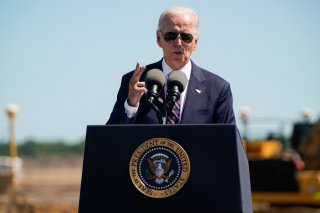How the White House Can Win the War for Blockchain
Blockchain, an elegant but sophisticated technology, isn’t something you can just wing.
In July, Congress passed the Chips and Science Act, which authorized a blockchain specialist for the White House Office of Science and Technology Policy (OSTP). But now, Congress should go further. The National Economic Council and the National Security Council need blockchain advisory specialists.
Why focus on the White House? Because anything well guided from the highest level of government is far more likely to become consequential. And blockchain, an elegant but sophisticated technology, isn’t something you can just wing.
In 2019, Chinese president Xi Jinping called upon China to occupy the “commanding heights” of blockchain technology. As a trained engineer, Xi is attuned to the implications of technology in a way that few American officials can be.
When the United States’ main rival spills the beans on its strategy, the administration would do well to take the cue. For America to maintain its status as the world’s technological leader, it must get it right at the highest nation-state level.
Executive Order 14067 is the perfect springboard for this advance. It states:
The principal policy objectives of the United States with respect to digital assets are as follows:
(a) We must protect consumers, investors, and businesses in the United States. The unique and varied features of digital assets can pose significant financial risks to consumers, investors, and businesses if appropriate protections are not in place. …
(b) We must protect the United States and global financial stability and mitigate systemic risk. …
(c) We must mitigate the illicit finance and national security risks posed by misuse of digital assets. Digital assets may pose significant illicit finance risks, including money laundering, cybercrime and ransomware, narcotics and human trafficking, and terrorism and proliferation financing. … When digital assets are abused or used in illicit ways, or undermine national security, it is in the national interest to take actions to mitigate these illicit finance and national security risks through regulation, oversight, law enforcement action, or use of other United States Government authorities.
Speaking with first-hand knowledge, we can confidently say that blockchain remains esoteric to federal agency managers. One of the greatest of Yogis, Yogi Berra, is said to have observed that “in theory, there is no difference between practice and theory. In practice, there is.” The United States deserves to have advisors who grasp the blockchain in theory and practice advising the president.
As H. William Dettmer wrote of Blitzkrieg Theory, the highest level of deft expertise was called fingersptizengefühl: “Literally ‘fingertip feel,’ or ‘touch,’ it really implies intuitive skill. … It's the kind of expertise that world-class musicians such as Yitzhak Perlman or Yoyo Ma have. They don't need to read the music and consciously translate it to hand movements; the music just flows from their heads, where they hear it in all its detail, through their fingertips to the instrument—instinctively and inherently correct the first time.”
For a potentially game-changing technology like blockchain, America deserves advisors with a fingersptizengefühl level of sophistication in the president’s immediate circle of policy advisors.
Adding a top-flight blockchain specialist to the White House OSTP is a great start, but it is ultimately insufficient. Next, fund and recruit counterparts for the National Economic Council and the National Security Council. These additions will provide invaluable expertise to the executive branch and allow America to dominate the commanding heights of blockchain technologically, economically, and as a matter of national security.
Todd White is the founder of American Blockchain PAC, where Ralph Benko is senior counselor.
Image: Reuters.

